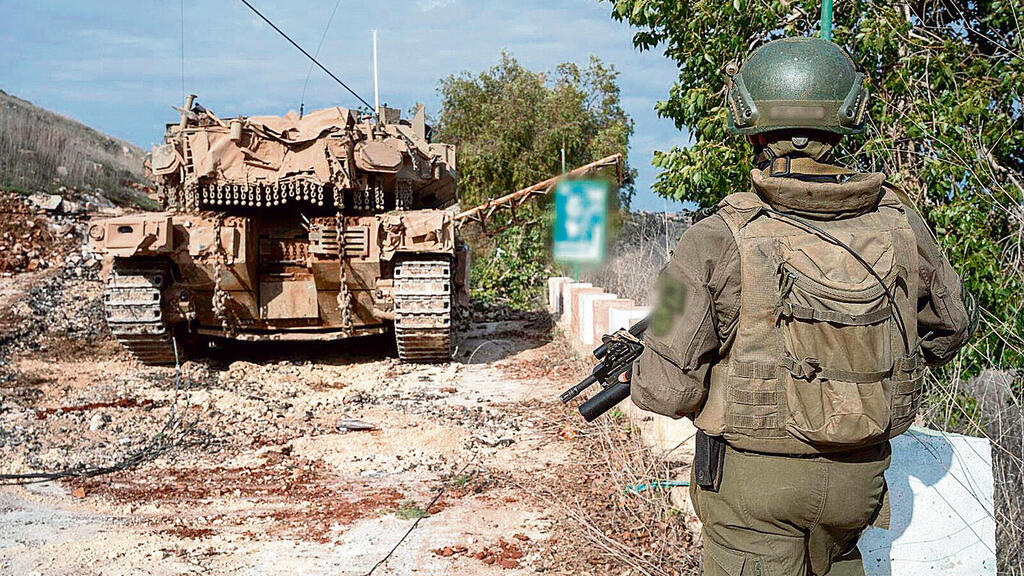Getting your Trinity Audio player ready...
Since the United States announced earlier this week that agreements had been reached to extend the cease-fire with Lebanon, the riots initiated by Hezbollah along the border - in which it sent hundreds of activists with the organization's flags to try to enter villages near the fence and confront IDF soldiers - have calmed down. On Tuesday, for example, there was a tense silence on the northern border. IDF forces continued to repel attempts by Lebanese civilians to approach the villages where they were prohibited from staying and fired deterrent shots at them.
The Israel Air Force, despite the cease-fire, attacked Hezbollah weapons , due to what was defined as a "violation of the agreement." A senior military official who is still operating with his forces in the depths of southern Lebanon told Ynet and Yediot Aharonoth that "until the Lebanese army fulfills its missions and demonstrates good and sufficient control over the territory, we will not recommend transferring control to them."
IDF forces operate this week in southern Lebanon
(Photo: IDF Spokesman's Unit)
The IDF plans to fill the additional three weeks, during which, according to the agreement, its forces will remain in southern Lebanon and conduct a long series of operations to destroy terrorist areas and collect weapons that Hezbollah has hidden and that still remain, mainly in the eastern sector, which borders the Upper Galilee.
"In the villages that are not adjacent to the fence in the western and central part of southern Lebanon, we have returned control to the Lebanese army. But in the villages that are adjacent to us and along the border fence, along its entire length, we are still there," the senior military official explained. He emphasized that no one in the IDF trusts the Lebanese forces to ensure the security of the residents who have already begun to return north. "The responsibility for the security of our residents lies with the IDF, and certainly not with the Lebanese army or any other foreign force," he said.
This clear statement is supported by the IDF's new defense concept on the northern border. "We organized the space differently," the senior official explained. "The concept today is that the IDF is at the front, even before the communities. Every town that exists, between the border fence and that town, will have an outpost."
So far, the establishment of several military outposts has been completed, in what will be - as the residents who are supposed to return to the north are demanding - an Israeli security zone.
"If we want the residents to return, there needs to be a strong and massive security zone," according to Rafi Biton, a native and resident of Avivim. "One that will give security to the residents here, and not like it was in the last decade when they simply abandoned us. They left us to rely on technological wonders like radars and cameras, and on the first day of the war, Hezbollah knocked everything down and left us naked."
Biton's family has been evacuated to a hotel in Tiberias since the outbreak of the war, and recently he has been trying to convince his wife, Rachel, and their children to return home, but without success. "After October 7, I no longer want to be in this place of fear," Rachel explained. "We lost our innocence."
According to the government's decision, which is based on the IDF's recommendation, tens of thousands of displaced people in the north can return to their homes on March 1. However, in accordance with the cease-fire agreement, the hundreds of thousands of displaced Lebanese whose homes served as infrastructure for terrorism and were part of the network of launch and attack posts for the Radwan forces will also be allowed to return and will ostensibly be able to rebuild their homes and even renew the terrorist infrastructure.
3 View gallery


Waving Hezbollah flags in southern Lebanon in the Kafr Qila area
(Photo: Rabih Daher / AFP)
The IDF is well aware of the residents' concerns.
"We will continue to act and remove any infrastructure that threatens, or could threaten in the future," said the senior military official. "We are certain that Hezbollah terrorists will not become peace activists, but will try to continue to establish themselves. We are using many tools and capabilities to understand what Hezbollah is trying to do. We are building the system in such a way that, whenever Hezbollah tries to establish something, our ability to handle it will be immediate, and not just the ability to watch it. We will make sure that they will not be used as terrorist infrastructure again. The responsibility on the IDF's shoulders is to make sure that Hezbollah does not establish its infrastructure again."
Get the Ynetnews app on your smartphone: Google Play: https://bit.ly/4eJ37pE | Apple App Store: https://bit.ly/3ZL7iNv
About six kilometers from Avivim, in the orchards of Kibbutz Malkia, veteran farmer Shai Golani says he believes that it is time to restore trust in the IDF and its soldiers.
"The army fought here and did an amazing job. The soldiers deserve all the praise, and right now we need to trust the international system and Israel," he said. "If I don't trust the people who ran the war here, then who will I trust? We were very complacent and we must never return to that complacent state, but I think that as citizens we need to believe that we have sobered up, that the IDF has sobered up, and that there is now much greater readiness."








